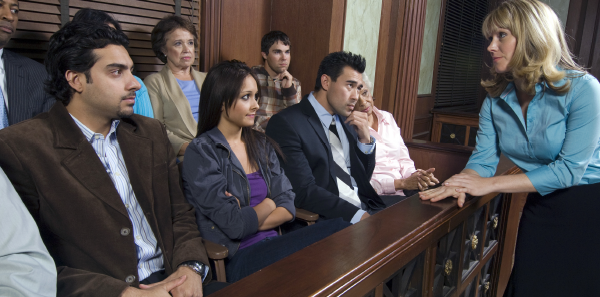
Case Presentations
After all of the jurors are selected and sworn in by the clerk and the judge has recited the jury instructions, opening statements begin. The plaintiff’s attorney usually goes first. Although this statement is meant to be more road map than argument, defendants often find listening to it very uncomfortable. It will, however, be followed by your attorney’s opening statement, which will hopefully put you a bit more at ease.
Explore This Issue
ACEP Now: Vol 40 – No 04 – April 2021After opening statements, the first witness is called by the plaintiff, whose side is typically presented first. Called one at a time, each witness is sworn in for testimony. Generally, they are either “fact witnesses,” whose testimony provides factual details of what took place, or “expert witnesses,” who render their professional opinions (in medicine, economics, or other relevant area) designed to teach the jury about the matter at hand. Even as defendant, you may be called as a fact witness by the plaintiff, even though most physicians can’t help but bring their expertise into their testimony. (We will discuss more about your testimony in Part 2 of this article.)
During the plaintiff’s presentation, each called witness is first questioned by the plaintiff’s attorney (“direct examination”), after which the defense attorney has time to question (“cross-examine”) them. This questioning is generally limited to topics brought up during the plaintiff’s questioning. The plaintiff then has the right to re-question (“redirect”) the witness, after which the defense can re-question (“re-cross”) if desired. During these examinations, the plaintiff’s attorney may ask the jury to review “exhibits,” or physical evidence, such as medical charts, photographs, diagrams, etc. Exhibits must be approved by a judge prior to being seen by the jury.
Once the plaintiff has finished calling all witnesses, they “rest” their case. Now it’s the defense’s turn. Given how emotionally difficult it might have been for you as the defendant to listen to the plaintiff’s attorney or experts portray you as an uncaring and incompetent physician, you may feel a bit better as your interpretation of the events as presented by the defense become clearer to the jury. The defense’s case proceeds in a similar manner to the plaintiff’s, until the defense also rests. Following the defense’s presentation, the plaintiff may call witnesses to respond to the defense’s case in a “rebuttal.”
Recess and Deliberations
After both sides rest their cases, there is usually a recess during which the judge and attorneys convene to discuss jury instructions, which may vary from case to case. Then everyone reassembles in the courtroom for the “charge to the jury,” wherein the judge instructs them on how to proceed with deliberations. The jury is responsible for deciding what the facts are, and the court is responsible for deciding what the law is.
After the jury is charged, the attorneys make their concluding arguments, and the jury departs the courtroom to deliberate. (In some states, concluding arguments occur before the jury is charged.) At this point, there’s nothing for the defendant to do but wait.
Jury deliberation may take hours or days. Your attorney will instruct you if you need to remain in court while deliberations take place. Once the jurors have reached a verdict, all parties reassemble to hear their decision. If a jury absolutely cannot come to a conclusion, there is the possibility of a “hung jury,” which results in a mistrial. There are numerous other reasons a judge may declare a mistrial, such as the death of a juror, the discovery of juror misconduct, or a fundamental error by an attorney or witness that may prejudice the jury in a way that can’t be easily remedied. In this event, the case may go to trial again in the future with a new jury, or the involved parties may decide not to proceed further.
Pages: 1 2 3 | Single Page




One Response to “Physician on Trial: What to Expect”
May 16, 2021
Bruce Oran, DO, FACEPDr. Pensa, Thank you for a very nice review. In my career of more than 30 years, I was sued once and it was a doozy! It happened in my third year of practicing emergency medicine. The good news is, I won! If I have one word of advice for young doctors who are sued, that is participate. I believed the suit was unjust and I fought back by attending every deposition, reviewed all the literature, medically educated my attorney, helped choose my experts! I was also fortunate in that my policy allowed me to REFUSE TO SETTLE.I encourage everyone to try to get that clause in your policy. The patient had a great deal of damage (locked-in syndrome) and became a very sympathetic plaintiff. My lawyer (who by the way it should be understood works for the insurance company), the insurance company, etc all wanted me to settle though all agreed that I did nothing wrong. I refused! I was being sued for amounts above my limits (a plaintiff strategy to make defendant worried)which gave insurance company lots of exposure, but since I was poor at the time, I did not care (I owned nothing). I went to trial incredibly prepared, spoke to the jury the way I speak to patients, and even though the plaintiff had much damage, the jury agreed with me, it was not my fault! I enjoy retelling this story as even after 30 years, my message is relevant…immerse yourself in the proceedings and play a very active role. I learned the style of the plaintiff’s attorney and recognized my own attorney’s medical weaknesses. My greatest pleasure was after I won, the plaintiff’s attorney came up to me and told me, “he never enjoyed a defendant more”. Thoughh fortunately, I never had to go through this again, it was an experience all could benefit by.